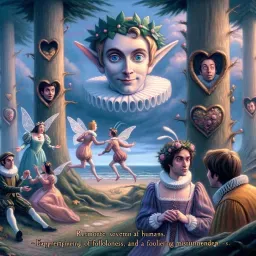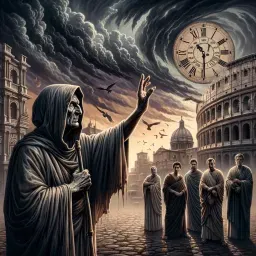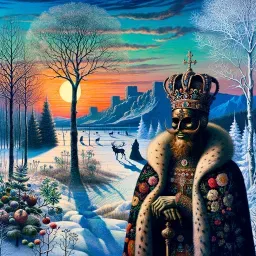The course of true love never did run smooth

0
0
0
0
- Meaning
- This phrase speaks to the challenges and obstacles that often accompany true love. It suggests that genuine love is rarely straightforward or free of difficulties. The metaphor of a "course" likens love to a river or path that is subject to twists, turns, and unforeseen barriers. It reflects the idea that true and deep emotional connections often require perseverance, resilience, and the ability to navigate through trials and tribulations.
- Allegory
- This image emphasizes the journey of love through its visual elements. The winding path represents the unpredictable nature of love, while the dense forest symbolizes life's complexities and challenges. Thorns and rocks indicate the obstacles lovers may face, reinforcing the phrase's meaning. The couple's unity and determination embody the idea that true love can overcome difficulties. The transition from stormy skies to a rainbow signifies hope and the reward of overcoming adversity, highlighting the transformative power of perseverance in love. The soft golden light guiding their path underscores the theme of resilience and the fulfillment that comes from enduring love.
- Applicability
- In personal life, this phrase can serve as a reminder to be prepared for challenges and to approach relationships with patience and dedication. It can encourage individuals to understand that difficulties are a natural part of loving relationships and that overcoming these obstacles can strengthen the bond between partners. It’s a comforting notion that even when times are tough, the effort to maintain a loving relationship is worthwhile.
- Impact
- This phrase has had a significant cultural impact, often quoted in literature, film, and everyday language to describe the rocky nature of romantic relationships. Its enduring popularity speaks to its universality, as many people can relate to the sentiment of love's hardships. It has inspired countless artists, writers, and thinkers to explore the complexities of love and relationships in their works.
- Historical Context
- Shakespeare's "A Midsummer Night's Dream" is believed to have been written between 1595 and 1596 during the Elizabethan era. This period was characterized by a flourishing of English drama and a strong influence of Renaissance culture. The play itself deals with themes of love, magic, and the complexity of human emotions, reflecting the era's fascination with romantic comedy and the human condition.
- Criticisms
- Some criticisms of this phrase might argue that it romanticizes suffering or implies that obstacles are a necessary component of true love, which can be seen as validating unhealthy relationship dynamics. Additionally, it may be challenged by those who believe that love can be simple and straightforward without significant turmoil.
- Variations
- Variations of this phrase can be found across different cultures and languages, often emphasizing the challenges or complexities of love. For example, in Chinese culture, there is a saying that translates to "Love’s road is bumpy," which expresses a similar idea. These variations underscore the universal nature of the sentiment that love requires effort and resilience.
-

The golden age is before us, not behind us.
-

All that glisters is not gold.
-

Lord, what fools these mortals be!
-

Good night, good night! Parting is such sweet sorrow, that I shall say good night till it be morrow.
-

Beware the Ides of March.
-

A little more than kin, and less than kind.
-

Out, out brief candle!
-

Et tu, Brute?
-

Friends, Romans, countrymen, lend me your ears.
-

Now is the winter of our discontent.
-

Though she be but little, she is fierce!
No Comments